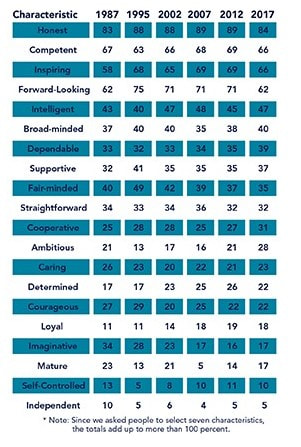There are many ways to think about leadership. For some, as we have seen, it’s about control or power. And for others, it is about achievement or recognition. For others, it’s about people and service, along with higher purpose and positive impact.
Since leadership by definition involves a relationship between leaders and followers—and, more precisely, an influence relationship—it begs the question of trust. One may be able to command, control, or deceive at some point or for some time, but for an enduring relationship of constructive influence, trust must be present.
Trust is a firm belief in the reliability or truth of someone. This takes us into the deep and rich territory of character, credibility, ethics, honesty, integrity, morality, and values—all of which are essential underpinnings and necessary prerequisites of good leadership. These virtues are good in and of themselves and should be aspired to by all (and, yes, even in competitive contexts such as business and sports).
The Business Case for Trust
There is also a “business case” for trust. Without trust in an organization or society, things take longer and cost more, due to the need for checks and reviews and the inevitable holding back that comes in such situations. In his book, The Speed of Trust, author Stephen M. R. Covey wrote, “Trust always affects outcomes—speed and cost. When trust goes up, speed will also go up, and costs will go down. When trust goes down, speed will also go down, and costs go up.” He and his father, Stephen R. Covey (author of The Seven Habits of Highly Effective People), brilliantly described leadership as “getting results today in a way that, by inspiring trust, increases our ability to get results tomorrow.”
Leadership scholars James Kouzes and Barry Posner, authors of the classic book, The Leadership Challenge, have been surveying people around the world for decades on the characteristics of admired leaders. More than 100,000 people worldwide have responded, and the findings are powerful:
“Credibility is the foundation of leadership. People must be able, above all else, to believe in their leaders. To willingly follow them, people must believe that the leaders’ word can be trusted….
Trust is the most significant predictor of individuals’ satisfaction within their organizations.”
-James Kouzes and Barry Posner, The Leadership Challenge
This is not rocket science. Imagine working for a leader or colleague whose behavior has demonstrated that he or she is not worthy of your trust, since he or she has deceived or used you. Imagine living with a family member or having a friend who abuses your trust.
Unacceptable. Such a situation requires change, and urgently so.
Of course, we all make mistakes and, when we do, thankfully we can redeem and make amends when others are kind and gracious enough to give us a second chance. But patterns of deceit warrant decisive action. Otherwise, we enable abuse and corrosive forces in our organizations and society.
Trust is essential in leadership—and in all forms of human relationships and organizations. Chronically failing the trust test is disqualifying for leaders.
Tools for You
- Traps Test (Common Traps of Living) to help you identify what’s getting in the way of your happiness and quality of life
- Quality of Life Assessment to help you discover your strongest areas and the areas that need work and then act accordingly
- Personal Values Exercise to help you clarify what’s most important to you
Related Articles
- The Root Cause of Ethical Failings
- Leadership and the Ethics Imperative
- Ethical Leaders: What They Do that Others Don’t
- The Importance of Integrity in Leadership
- The Importance of Credibility in Leadership
- The Problem of Bad Leaders—and Why People Keep Following Them
++++++++++++++++++++++++++++++
Gregg Vanourek is a writer, teacher, TEDx speaker, and coach on leadership and personal development. He is co-author of three books, including LIFE Entrepreneurs: Ordinary People Creating Extraordinary Lives (a manifesto for living with purpose and passion) and Triple Crown Leadership: Building Excellent, Ethical, and Enduring Organizations (a winner of the International Book Awards). Check out his Best Articles or get his monthly newsletter. If you found value in this article, please forward it to a friend. Every little bit helps!






